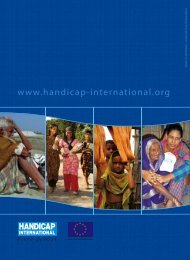Full page photo print - Harvard Law School Project on Disability
Full page photo print - Harvard Law School Project on Disability
Full page photo print - Harvard Law School Project on Disability
Create successful ePaper yourself
Turn your PDF publications into a flip-book with our unique Google optimized e-Paper software.
PARTiciPATi<strong>on</strong> in voTing And oTheR elecToRAl PRocesses<br />
The CRPD provides that people with disabilities have the right to vote, which means that<br />
they have the right to register to vote, to receive voting informati<strong>on</strong>, and to cast their ballot<br />
<strong>on</strong> electi<strong>on</strong> day . States are required to provide procedures and facilities for voter registrati<strong>on</strong><br />
and polling that are accessible to people with disabilities . States are also required to ensure<br />
that all voters have the right to vote in secret . Although the right to register to vote and to vote<br />
<strong>on</strong> polling day extends to all people, it is subject to the usual eligibility requirements such as<br />
age and nati<strong>on</strong>ality. Certain disqualificati<strong>on</strong>s may apply to otherwise eligible voters, including<br />
sentencing by a competent court in criminal proceedings. Other disqualificati<strong>on</strong>s may be based<br />
<strong>on</strong> a declarati<strong>on</strong> of legal incompetence or incapacity by a court, which often impacts people<br />
with intellectual and psycho-social disabilities. In the absence of such disqualificati<strong>on</strong>s, no<br />
pers<strong>on</strong> can be barred from exercising his or her right to vote, provided she or he meets the<br />
other eligibility requirements. In practice, disqualificati<strong>on</strong>s relating to mental capacity are much<br />
abused; they are applied arbitrarily and without court declarati<strong>on</strong>s . In this c<strong>on</strong>text, therefore,<br />
educati<strong>on</strong> of voters, registrati<strong>on</strong> and polling officials, and people with disabilities themselves is<br />
particularly important .<br />
Voting procedures and facilities must be accessible to people with disabilities . Polling stati<strong>on</strong>s<br />
must be free of physical barriers that might prevent a pers<strong>on</strong> with a physical disability from<br />
registering or voting . For example, stairs are barriers for people who use wheelchairs or have<br />
mobility impairments and can also present dangers to blind voters and voters with visual<br />
impairments . Communicati<strong>on</strong> barriers can prevent voters with hearing impairments from<br />
exercising their right to register and to vote . Sign language interpreters or written material,<br />
highlighted with clear illustrati<strong>on</strong>s may provide accommodati<strong>on</strong>s for such voters . Plain language<br />
materials may assist voters with intellectual disabilities in exercising their right to vote . The<br />
training of electi<strong>on</strong> officials is essential to enable voters with disabilities to be appropriately<br />
accommodated and treated in a n<strong>on</strong>-discriminatory manner .<br />
All people have the right to vote in secret, an absolute right that may not be restricted . In many<br />
countries, however, voting and registrati<strong>on</strong> procedures are not made accessible to people with<br />
disabilities to allow for their secret voting, especially for blind voters . Blind voters may exercise<br />
their right to vote in secret with a tactile ballot guide or with a voting machine that has audible<br />
instructi<strong>on</strong>s . Many countries have introduced accessible procedures that provide blind voters<br />
with the right to vote in secret . (See text box below) .<br />
Tactile ballot guides for blind voters<br />
In the 2005 Liberian electi<strong>on</strong>s, the Nati<strong>on</strong>al Electi<strong>on</strong>s Commissi<strong>on</strong>, together with the<br />
Internati<strong>on</strong>al Foundati<strong>on</strong> for Electi<strong>on</strong> Systems (IFES), <str<strong>on</strong>g>print</str<strong>on</strong>g>ed Tactile Ballot Guides to<br />
enable blind voters to mark their ballot independently, thereby preserving their rights to vote<br />
in secret. Electi<strong>on</strong> officials were trained <strong>on</strong> the use of this guide so that they could assist<br />
blind voters wishing to use them . A coaliti<strong>on</strong> of organizati<strong>on</strong>s for pers<strong>on</strong>s with disabilities<br />
held voter educati<strong>on</strong> sessi<strong>on</strong>s throughout Liberia in which they explained to blind voters<br />
how to use the guides . IFES has facilitated the introducti<strong>on</strong> of Tactile Ballot Guides in many<br />
countries, including Armenia, Ghana, and Yemen .<br />
54 humAn RighTs. yes! AcTi<strong>on</strong> And AdvocAcy <strong>on</strong> The RighTs of PeRs<strong>on</strong>s wiTh disAbiliTies




